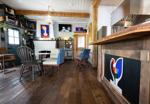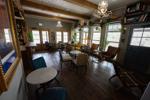takanadalagi.blogspot.com
In 2019, twin sisters Jo and Joy Banner opened Fee-Fo-Lay Café in the tiny town of Wallace, Louisiana, population 775. Using her grandmother’s recipe, Jo wanted to make and sell Louisiana cookies called t-cakes. After a stint working in local tourism, she thought a café that catered to tourists passing through would be the perfect way to build the local economy while selling tasty treats.
It turns out, however, that the café’s location in St. John the Baptist Parish comes with unique challenges. At the same time, it offers opportunities to further environmental justice.
Fee-Fo-Lay’s quaint, covered porch faces a long grassy hill that is actually the back of a levee marking the bank of the mighty Mississippi River. The mound of earth hides the smokestacks, flares, and hulking industrial structures that loom over the river in every direction. Just across the river from the café is the Atlantic Alumina factory, where buildings across the entire complex are tinted red due to bauxite ore, a potentially toxic material used in aluminum production. The Marathon Petroleum refinery is right up the river. Shell Norco’s petrochemical plant is around the next bend.
It’s a region northwest of New Orleans that many years ago was given the nickname “Cancer Alley.” For decades, residents have been pointing to the concentration of pollution from hundreds of oil refineries, chemical plants, and other factories to explain how often they and their families have received cancer diagnoses. Recently, researchers in Tulane’s Environmental Law Clinic provided new science to back up their claims. Their study confirmed that toxic air pollution in the region is in fact linked to higher rates of cancer in its residents, who are disproportionately Black.
Before industry moved in, the same stretch of river was dotted with sugarcane plantations. Now, the descendants of the enslaved people who were forced to work the fields populate towns like Wallace. Jo and Joy Banner’s descendants worked on at least two nearby plantations.

Jo Banner stands next to the field where the Greenfield grain elevator will be built. (Photo by Lisa Held)
In 2020, the sisters created the Descendants Project to protect the health, land, and lives of the Black river parish communities they were born into. Now, they’ve thrown themselves into defending Wallace from an industrial development that stands to completely transform the town. In the wide-open field next to Fee-Fo-Lay, construction pilings mark the beginning of a planned grain shipping terminal that would receive barges packed with corn and other grains from Midwest farms, store the grain, and then transfer it to ocean vessels for export.
The planned 54 silos and conveyor structure on the site would tower over the village and café and potentially add particulate matter to the air, exacerbating air pollution. (Greenfield says the facility will be built with state-of-the-art technology that minimizes airborne pollutants and that many local residents support the development based on jobs and economic development it will provide.)

Joy (left) and Jo Banner. Photo courtesy of Jo Banner.
Fighting the terminal project and working to preserve their community has taken so much energy, the sisters can’t keep Fee-Fo-Lay open for regular daily hours anymore. Instead, the café has become a ground zero for community action, environmental justice tours, and activism to protect their cultural heritage.
“It’s my platform,” Jo said earlier this year, while sitting underneath the sprawling live oak that frames the front yard. In the past month, they’ve hosted a handful of groups, including environmental advocates, journalists, students, and community members. On March 12, they’re hosting a musical pilgrimage event with the nearby Whitney Plantation to trace connections between the land, the river, and the area’s residents, concluding at the café.
Jo Banner is frustrated that she can’t simply spend her days making t-cakes and pralines, serving coffee and beignets, and improving the financial health of the business. But she says the choice was clear. “Do I sacrifice my community, or do I sacrifice the business? For me and Joy, we’ve got to fight for the community and fight for what’s right, fight for all the people that have been living here and would not be comfortable living anywhere else.”
Civil Eats recently spoke with Jo Banner about her family history in Wallace, telling stories beyond the plantation, and why she and her sister are fighting the planned grain elevator.
You grew up in Wallace. Why did you and your sister decide to spend your lives there and commit so strongly to the place?
Adblock test (Why?)
"cafe" - Google News
March 28, 2023 at 04:05PM
https://ift.tt/u3HLQhx
How a Louisiana Café Became Home Base for Environmental Justice - Civil Eats
"cafe" - Google News
https://ift.tt/dMTAPfE
https://ift.tt/iQ7XboB






























/cloudfront-us-east-1.images.arcpublishing.com/gray/SSNDUHCPEBDQBM57WTXDBPRQKI.png)









:no_upscale()/cdn.vox-cdn.com/uploads/chorus_asset/file/25244079/4.png)